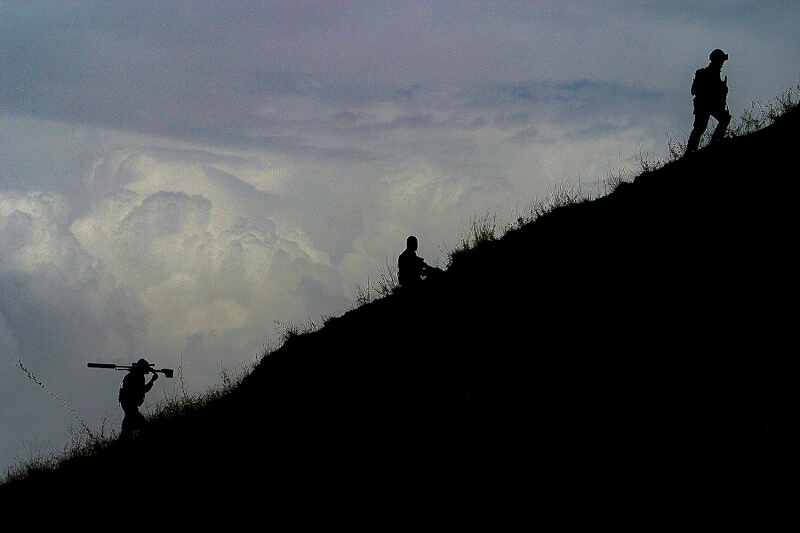
A Canadian sniper team from the 3RCR Battle Group ascends to an overwatch position in Afghan mountains west of Kabul during a 2002 NATO reconnaissance operation.
[Stephen J. Thorne]
Perhaps not.
At 1.33 per cent of GDP, Canada’s defence spending is well below NATO’s expectations, placing it 27th among the alliance’s 32 members—only 11 of whom met the two per cent threshold in 2023. In terms of actual dollar amount spent on its military, Canada—a founding member of the alliance—ranks seventh.
The countries that place ahead of it in percentage-of-GDP spending include front-line states such as Latvia, Lithuania, Bulgaria, Estonia, Finland, Hungary, Slovakia and Czechia—all of which Canada outspends in actual dollars.
In fact, only one country in Russia’s immediate sphere of influence—Poland, which leads all NATO members at 3.9 per cent of GDP spending on defence—actually spends more than Canada on its military. And barely.
Royal Canadian Air Force Colonel John Alexander has called the two per cent figure “a crude measurement,” saying it in no way addresses how the money is being spent.
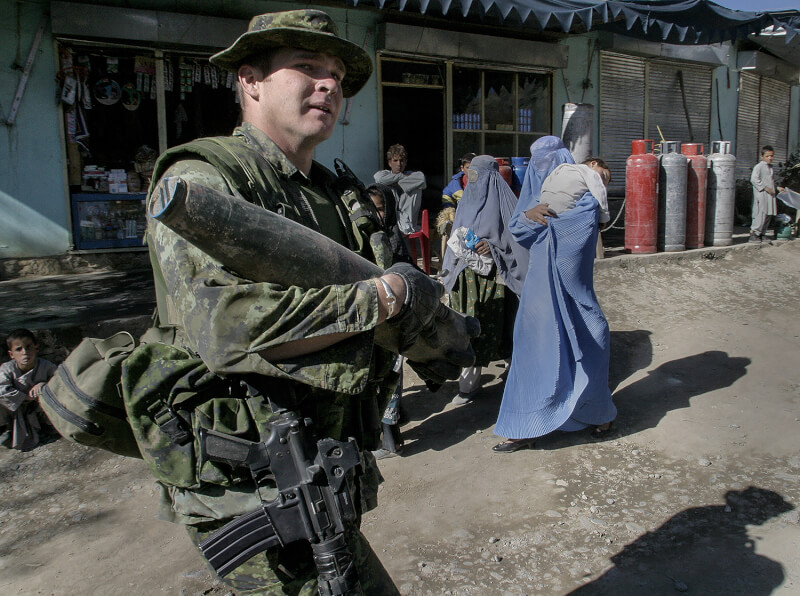
Cpl. Bryan Toope of Ottawa cradles a Soviet-made 122mm rocket while an Afghan woman cradles her baby in Paghman outside Kabul, on Monday, Nov. 10, 2003. Canadian soldiers serving with NATO forces seized more than 30 rockets, mortars and recoilless rifle rounds.
[ Stephen J. Thorne]
Furthermore, NATO members are wildly inconsistent in how they calculate defence expenditures. Canada, for example, doesn’t count its coast guard as a defence expense; other countries do. Canada counts veterans’ benefits in its calculations; others don’t.
“These differences demonstrate the difficulty of using this type of measurement to determine real levels of military investment and financial support,” Alexander wrote in a 2015 edition of the Canadian Military Journal.
Such fundamental flaws don’t appear to matter to the perpetual critics who see only a number, a benchmark not met, and opportunity to make political hay, or worse.
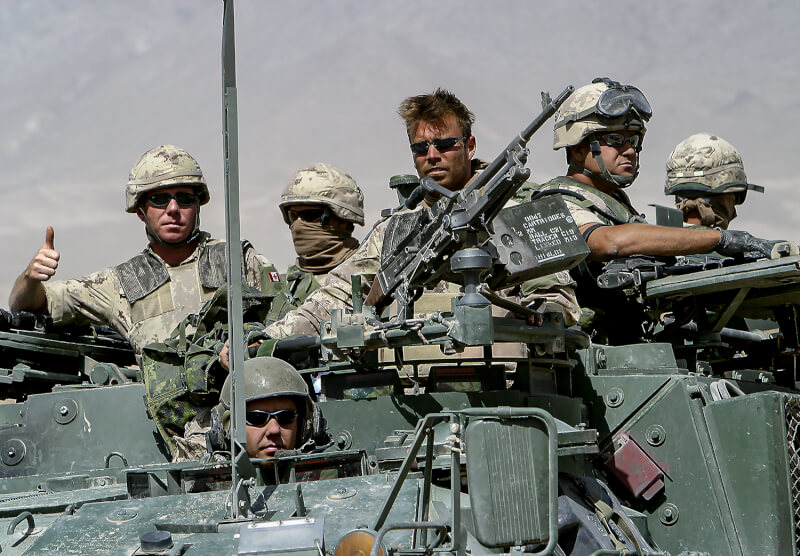
Canadian combat engineers serving with NATO forces take a break near the village of Leyvani, Afghanistan, on Monday, July 5, 2004. Canadians had been told the area was a Taliban hotbed, but finding them was proving difficult.
[Stephen J. Thorne]
“Canada [author’s emphasis],” they wrote prior to the July 2024 NATO summit in Washington, “will fail to meet its obligations to the Alliance, to the detriment of all NATO Allies and the free world, without immediate and meaningful action to increase defense spending.”
Canada.
The group included such Republican luminaries as Ted Cruz of Texas and Dan Sullivan of Alaska, who once declared Canada is “not even close to pulling its weight.”
Shall we remind them that the United States is the only G20 nation lacking universal health insurance? Or that 30 million Americans are uninsured? Or how about that The Commonwealth Fund ranked the U.S. last overall in a survey of health-care systems in 11 countries?
America’s performance “falls well below the average of the other countries and far below the two countries ranked directly above it, Switzerland and Canada,” said the survey. “In fact, the U.S. is such an outlier that we have calculated the average performance based on the other 10 countries, excluding the U.S.”
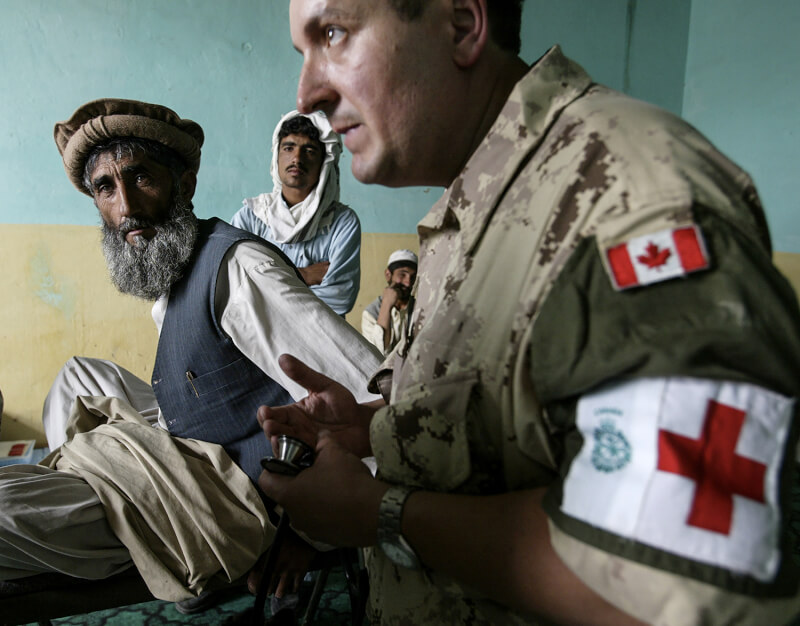
Capt. Americo Rodrigues, a military doctor assigned to the 3R22R Battle group, conducts a clinic for residents of a remote Afghan village in mountains northeast of Kabul in 2004.
[Stephen J. Thorne]
Trudeau defied the ambassador’s prediction, telling his contemporaries at the July NATO summit that the country would reach NATO’s two per cent benchmark by 2032.
Not good enough, say the American critics.
“They have the safety and security of being on our border and not having to worry about that. I think that’s shameful,” said Republican House Speaker Mike Johnson.
“I think if you’re going to be a member nation and participant, you need to do your part.”
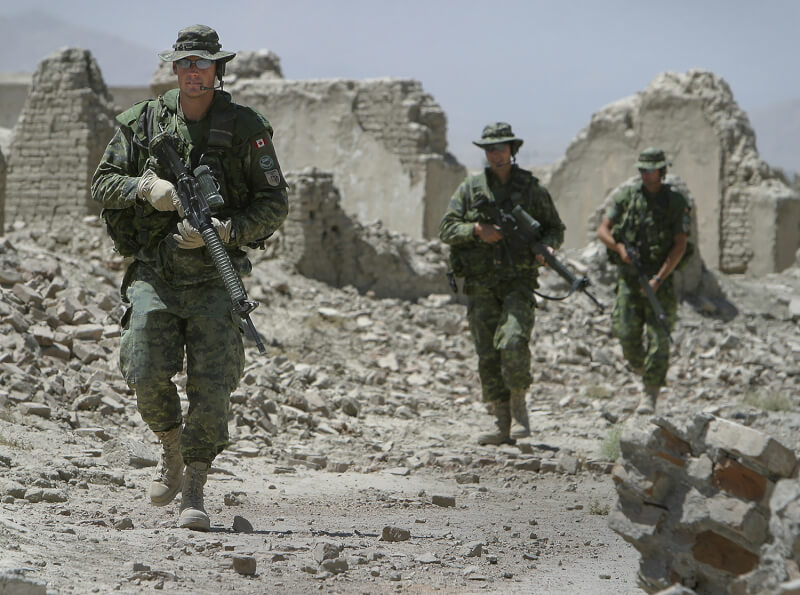
Canadian paratroopers from the 3R22R Battle Group pass through ruins in Kabul while conducting the last patrol of their tour with NATO forces in Afghanistan on Thursday, Aug. 5, 2004. A Norwegian-led battle group took over the Canadian sector later in the day.
[ Stephen J. Thorne]
That’s why Canada has been a staunch partner in the North American Aerospace Defense Command (Norad), the watchdogs of Canadian-American airspace for the last 66 years.
“Canada’s commitment to Norad is steadfast,” Defence Minister Bill Blair declared at a Norad change-of-command ceremony in February 2024.
Canada is spending $38.6 billion over 20 years on next-generation radar systems, binational command and control systems, Northern airfields, and fighter infrastructure to facilitate the new F-35’s role in continental defence.
In April 2024, the new Norad commander, General Gregory M. Guillot, said he was “very encouraged” by Ottawa’s plan to boost defence spending and its commitment to Arctic sovereignty.
Asked if he thinks Canada is showing up with the appropriate level of seriousness about defence, Guillot replied: “Absolutely, no question at all.”
At 11 per cent of the U.S. population, or just more than 38 million citizens, and a fraction of the American defence budget (currently US$883.7-billion), Canada has nonetheless hit above its weight militarily for more than a century.
Its contributions have included decades of UN peacekeeping and 13 years in Afghanistan (a NATO mission), along with annual foreign aid and disaster relief efforts. Not to mention the full run of two world wars and Korea (a UN operation).
Canada has been a staunch supporter of Ukraine, providing $4.5 billion in equipment, training and other support since Russia invaded the country in February 2022. It’s also maintaining a long-term presence with the NATO deterrence force in Latvia, which it currently leads with 1,650 personnel.
Trudeau recently noted Canada has increased defence spending by $175 billion since his government was first elected in 2015. The forces are in a state of decline and more should be done, no doubt, but it has to be done as Canadians dictate.
That American politicians would try to tell Canada how to manage its affairs is an affront. It goes to the heart of Canadian sovereignty and the rights of Canadians to choose their own way forward without outside interference.
Canada’s priorities belong to Canadians and no one else, least of all right-wing American political hacks, some of whom are in the pockets of the very defence contractors who stand to gain by increases in military spending.
Canadians cherish their universal health care, their systems of education and social welfare, their worldwide reputation for tolerance and generosity. No American or anyone else can change that.
Advertisement





















